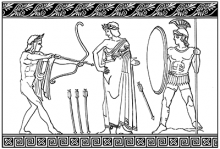
You are here
Episode 11: Love and Death
Story summary
Teaching activities
- Starting points
- Follow-up
- Further activities
-
Achilles is now portrayed as a more complex character. Do children think that he has changed during the story? If so, how has their opinion of him altered?
-
In Episode 10 there was a particular moment when Achilles fell in love with Polyxena. Can children recall that moment? (It was when she took off her rings to make the scales balance.) What was it that caused Achilles to feel love for her? (Achilles saw that her love for her brother and father was worth so much more than her fine jewellery.)
-
Can the children see the difficulties that lie ahead for this couple? Discuss how other members of Hector’s family would react to Achilles, such as Hecuba, Deiphobus, Paris or Andromache. (Achilles has now killed Andromache’s brothers, parents and husband.) Use the family tree to see which people would be affected by the Achilles/Polyxena relationship.
-
Ask the class to recall the wedding of Peleus and Thetis. Who gave them what presents? (Athene, a spear; Ares, a golden breastplate; Aphrodite, the ring; Poseidon, four horses; Zeus, the Myrmidons; Hades, a black funeral urn.)
-
Just before you listen ask the children about the title. Whose love and whose death does this refer to?
-
The death of Achilles is a pivotal event and most children will be affected by it. At the end of this episode it is best to discuss this straight away, since you can come back to other aspects of the narrative later. The class will have a spent a long time with this character and got to know him well. Children have seen Achilles at his worst and best. Give them the chance to talk about their responses as a class group and in smaller groups. Appoint a spokesperson from each to take notes and to report back. In this way you can build a composite picture of Achilles and explore facets of his character.
-
Each group could be responsible for writing an obituary and these could be displayed around a large painting/drawing/collage of Achilles, forming the centre piece of a larger display. It is possible to do the same activity with the character of Hector.
-
In this episode the gods are busy manipulating and plotting to bring about their own desires. Discuss who these gods are, what they want and how they try to achieve their aims. If you have one, refer to the family tree of the gods. You could choose appropriate colours to show their Greek or Trojan allegiances.
-
Episodes 10 and 11 end in the same way. Can the children recall how? (Andromache is grieving over the death of her husband, Thetis is grieving over her son.) What does each of them say?
-
Ask the class to explain Aphrodite’s plan. (She makes Achilles and Polyxena fall in love so that Achilles will reveal his weakness while Paris is listening.)
-
‘Love’ plays an important part in many of the characters and actions described in War with Troy. Discuss the different ways in which love has influenced the story, asking children to match examples to characters (e.g. Thetis as a mother loves her son, Achilles; Achilles as a friend loves Patroclus; Hector as a prince loves his country).
What do the children think of the way Paris behaved? Who had he fallen in love with? Paris loved Helen, a Greek queen. His sister, Polyxena, loved Achilles, a Greek prince. Discuss the behaviour of Paris in this context.
Visual aids
The death of Achilles
Based on red-figure vase by the Niobid Painter, c. 460 BC. Antikenmuseum, Ruhr-Universität, Bochum. This rather crude depiction of the death of Achilles is slightly different from the description in Episode 11. Instead of being caught with Polyxena, Achilles is shown here in full armour, apparently about to fight Paris. But on one point the two versions agree: the death of Achilles is brought about by Apollo (centre) redirecting an arrow fired by Paris (left).
